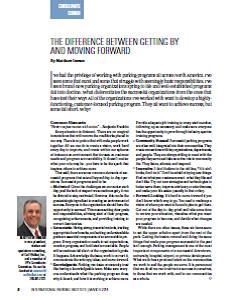I’ve had the privilege of working with parking programs all across North America. I’ve seen some that excel and some that struggle with seemingly basic responsibilities. I’ve seen brand-new parking organizations spring to life and well-established programs fall into decline. What differentiates the successful organizations from the ones that have lost their way? All of the organizations I’ve worked with want to develop a highly-functioning, customer-focused parking program. They all want to achieve success, but some fall short. Why?
Common Elements
“Never confuse motion with action.” —Benjamin Franklin
Every situation is different. There are no magical incantations that will remove the roadblocks placed in our way. There is no potion that will make people work together. All we can do is create a vision, work hard every day to improve, and create within our spheres of influence an environment that focuses on customer needs and program accountability. It doesn’t matter what your role may be—you have to be the spark that inspires others to achieve more.
That said, there are some common elements of successful programs that extend beyond day-to-day operations. Successful programs tend to be:
Motivated. Given the challenges we encounter each day (and the lack of respect we sometimes get), it can be difficult to stay motivated. However, this can be the greatest single ingredient to creating an environment of success. Everyone in the organization should have the opportunity to succeed. This means setting clear goals and responsibilities, advising staff of their progress, recognizing achievements, and providing training to correct deficiencies.
Accountable. Having strong financial controls, tracking appropriate benchmarks, and setting understandable goals are essential components of an accountable program. Every organization needs to set expectations, monitor progress, and hold staff accountable. People will sometimes fall short of the organization’s goals. It happens. Acknowledge the issue, work to correct it, communicate the action(s) taken, and move forward.
Knowledgeable. Nothing can foster community trust like having a knowledgeable team. Make sure everyone understands what the parking program does, why it does it, and how it is working to achieve more. Provide adequate job training to every staff member, following up as necessary, and make sure everyone has the opportunity to grow through industry-specific training programs.
Community-Focused. Successful parking programs are often well-integrated into their communities. They create connections with key organizations, departments, and people. They are always willing to meet with the people they serve and take an active role in community life. They listen, educate, and respond.
Innovative. I don’t believe in the old line, “If it ain’t broke, don’t fix it.” Don’t be afraid of trying new things. Find out what your customers want—what they like and don’t like. Try out new strategies and technologies to better serve them, improve efficiency or effectiveness, and make your life easier (usually in that order).
Forward-Looking. It’s hard to move forward if you don’t know which way to go. You need a roadmap: a vision of where you want to be and a plan to get there. Get out of the day-to-day grind and take some time to review your situation, visualize what you want your program to become, and decide what changes are needed.
While there are other issues, these six items seem to set the upper echelon apart from the rest of the pack. Getting the basics covered and doing the same things that made your program successful in the past isn’t enough. Parking management is one of the most important components of a successful downtown, university, hospital, airport, or private development. What we do has a profound effect on the communities we work in and the people we serve. It is paramount that we do all we can to strive for success in ourselves, in those that we work with, and in our communities as a whole.
Matthew Inman is vice president, studies and operations consulting, of Carl Walker, Inc., and a member of IPI’s Consultants Committee. He can be reached at minman@carlwalker.com or 269.381.2222.
TPP-2014-03-The Difference Between Getting By and Moving Forward

